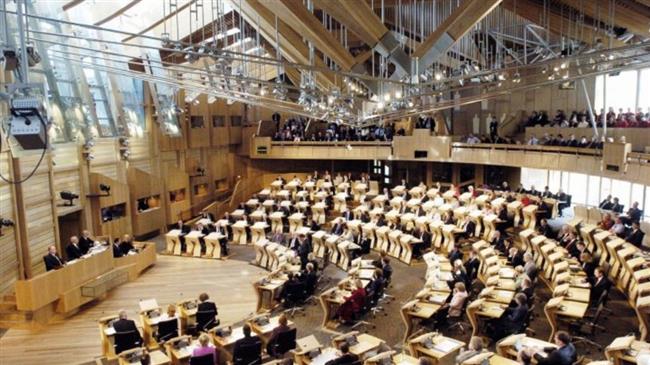Scottish parliament decisively rejects May’s EU withdrawal bill
The Scottish parliament has decisively voted against the United Kingdom's legislation on departure from the European Union (EU), placing London on course for a major constitutional dispute with Edinburgh and the further postponement of Brexit.
The Scottish lawmakers rejected British Prime Minister Theresa May’s EU Withdrawal Bill by 93 votes to 30 on Tuesday.
Labour, the Liberal Democrats and Scottish Greens backed First Minister Nicola Sturgeon’s party members in rejecting the divorce bill, arguing that it would restrict Holyrood's powers.
The vote is not legally binding but it will force London to make a high-risk decision and assert power over Edinburgh or make further concessions to the Scottish government to avoid a crisis.
May’s disregard for the vote could fuel Sturgeon’s demands for a second referendum on Scottish independence and provide her Scottish National Party (SNP) with a further justification for staging one.
Britain has been at loggerheads with the devolved nations - Scotland, Northern Ireland and Wales - on how power would be shared after the Britain’s separation from the 28-member bloc.
Speaking after the Tuesday vote, Scotland's Brexit secretary Mike Russell, called on the UK government to respect the will of the Scottish parliament and find an acceptable solution.
"The Scottish Parliament has now said overwhelmingly that this attempt to undermine devolution is unacceptable,” he said. "The UK government cannot ignore the reality of devolution or try to drown out what this parliament says. They cannot pretend that no motion has been passed."
A day earlier, Sturgeon warned London against ignoring the Holyrood's views and said May needed to secure a deal with Edinburgh fast.
“They [UK government] have a decision to make as to whether they are going to ignore the views of the Scottish Parliament or listen to those views and try very hard to get a deal and to close the gap that remains between us,” she said.
In the United Kingdom’s 2016 referendum, 52 percent, or 17.4 million people, voted to leave the EU while 48 percent, or 16 million, voted to stay.
The British government has faced fierce criticism both at home and by the EU for its lack of clarity on its Brexit strategy.
The uncertainty has raised fears that Britain could crash out of the bloc without a trade deal, incurring heavy costs on its domestic economy.
London and Brussels are due to move on to the next stage of Brexit negotiations this year, after reaching agreement in December on exit terms.
In Christmas message, Pope laments ‘extremely grave’ situation in Gaza
Hamas says Israel created new obstacles to Gaza truce deal
Pakistani military conducts airstrikes on militant hideouts in eastern Afghanistan
VIDEO | Displaced settlers frustrated
VIDEO | Christmas: Time for peace
Turkey will bury Syria’s Kurdish militia if they fail to disarm: Erdogan
VIDEO | Christmas in Syria: Hope amidst uncertainty
Israel attacks eastern Lebanon for first time since ceasefire












 This makes it easy to access the Press TV website
This makes it easy to access the Press TV website